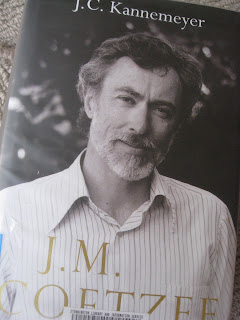If I had not read Summertime, I would have passed by the copy of J M Coetzee: A Life in Writing on the new acquisitions rack at the library. But Summertime intrigued me, and I was thus encouraged to look at this book, with a particular view to ascertaining to what extent Summertime was autobiographical.
The first thing that must be stated is that it's impossible in a note such as this to do justice either to Coetzee or to J C Kannemeyer's biography.
Coetzee has received numerous awards and honours, including the Booker prize twice (on neither occasion did he attend the presentation in person) and the Nobel Prize for literature, and Kannemeyer's monumental biography is impressive. It contains a vast amount of information in its more than 600 pages. True, the detail is sometimes a bit tedious, and things are occasionally out of sequence and there is some repetition, but overall, the reader is given a real insight into Coetzee the person and the events and circumstances that have influenced his writing. No doubt this is assisted by the fact that, although a private person, Coetzee granted Kannemeyer interviews and put him in touch with family, friends and
colleagues. Coetzee also provided him with comprehensive documentation
in his private possession. It appears that Coetzee has retained much of his personal correspondence and many of his draft manuscripts. In fact, Kannemeyer was given access to the manuscripts for Slow Man - there were 25 versions!
The book pays particular attention to the genesis of each of Coetzee's books, but it also touches on his marriage, divorce, subsequent relationship and some of the misfortunes that have affected his life (including his father's dishonesty and alcoholism and the death of his son when aged 23). However, the emphasis is on his writing, and thus the work will be of interest to be students of literature. I admit that, because of this focus, I skimmed quite a few pages!
Just the same, it does deal the turmoil in the personal life and times of this enigmatic, elusive writer at a various stages of his career, including the stresses that Coetzee was placed under as an academic in the English faculty at the University of Cape Town during the height of the apartheid era, a regime that he strongly disagreed with.
Australians will be interested in the fact that Coetzee, who had not visited Australia until he was 50, elected to relocate to the Adelaide Hills in 2002 following his retirement from the University of Cape Town, notwithstanding his long connection with the United States (particularly the University of Chicago) and, to a lesser extent, Europe. The reasons for this are complex, but appear to include his disillusionment with the political situation in the United States, the fact that he was not entirely comfortable in the English landscape (being accustomed to the spaces of the Koroo in South Africa) and the reaction of the ANC to Disgrace. The latter is apparently sometimes said to be the reason for the move, but Kannemeyer states that, although this may have tipped the balance, it would be an over-simplification to attribute his departure from South Africa exclusively to it. One factor seems to be that he was charmed by Australia! He is also said to have considered that the issues in Australian politics are "trifling" compared with the big political themes involving meaningful national issues that arise in South Africa.
And the relationship of Summertime to Coetzee's own life? This book was written in 2005-2009, in Adelaide. In short, the setting of Summertime is fictional in that Coetzee never lived alone with his father and in that sense the work is not autobiographical. Nevertheless, the various scenarios described appear to derive from incidents in his life, although they have been modified and (perhaps) embellished. In fact, even within the book, discrepancies are apparent, for example, between what was said at one of the purported "interviews" and what is recorded. Layer upon layer of complexity! Apparently, the earlier works in of Boyhood and Youth are closer to being autobiographical; I must make a point of reading these.


No comments:
Post a Comment